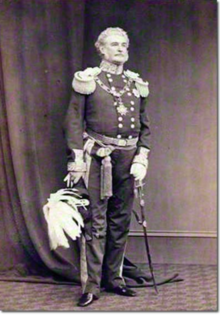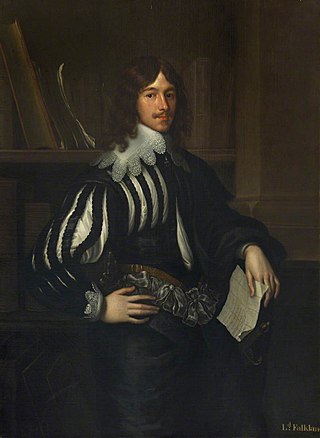
Lucius Cary, 2nd Viscount Falkland PC was an English author and politician who sat in the House of Commons from 1640 to 1642. He fought on the Royalist side in the English Civil War and was killed in action at the First Battle of Newbury.

Viscount Falkland is a title in the Peerage of Scotland. The name refers to the royal burgh of Falkland in Fife.

Earl of Donoughmore is a title in the Peerage of Ireland. It is associated with the Hely-Hutchinson family. Paternally of Gaelic Irish descent with the original name of Ó hÉalaighthe, their ancestors had long lived in the County Cork area as allies of the Mac Cárthaigh clan; they lost out during the times of Oliver Cromwell. One branch of the family converted to the Anglican Church and after inheriting territories through his mother and adding "Hutchinson" to Hely, became the Earl of Donoughmore.

Baron Hunsdon is a title that has been created three times.

Henry Hardinge, 1st Viscount Hardinge, was a British Army officer and politician. After serving in the Peninsular War and the Waterloo Campaign he became Secretary at War in Wellington's ministry. After a tour as Chief Secretary for Ireland in 1830 he became Secretary at War again in Sir Robert Peel's cabinet. He went on to be Governor-General of India at the time of the First Anglo-Sikh War and then Commander-in-Chief of the Forces during the Crimean War.
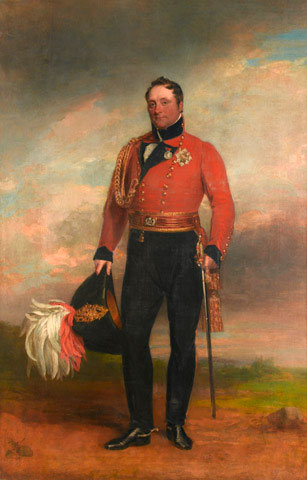
General Rowland Hill, 1st Viscount Hill, was a British Army officer and English aristocrat who served in the Napoleonic Wars as a brigade, division and corps commander. He became Commander-in-Chief of the British Army in 1828. Well-liked by the soldiers he commanded, he was known as "Daddy Hill".

Dudley Ryder, 2nd Earl of Harrowby, KG, PC, FRS, styled Viscount Sandon between 1809 and 1847, was a British politician. He held office under Lord Palmerston as Chancellor of the Duchy of Lancaster in 1855 and as Lord Privy Seal between 1855 and 1858.
Henry Burton Conyngham, 1st Marquess Conyngham,, known as The Lord Conyngham between 1787 and 1789, as The Viscount Conyngham between 1789 and 1797 and as The Earl Conyngham between 1797 and 1815, was an Anglo-Irish courtier and politician of the Regency period. He served as Lord Steward between 1821 and 1830.

Field Marshal Stapleton Cotton, 1st Viscount Combermere, was a British Army officer, diplomat and politician. As a junior officer, he took part in the Flanders Campaign, in the Fourth Anglo-Mysore War and in the suppression of Robert Emmet's insurrection in 1803. He commanded a cavalry brigade in Sir Arthur Wellesley's Army before being given overall command of the cavalry in the latter stages of the Peninsular War. He went on to be Commander-in-Chief, Ireland and then Commander-in-Chief, India. In the latter role he stormed Bharatpur—a fort which previously had been deemed impregnable.

John Nevill, 3rd Earl of Abergavenny, styled Hon. John Nevill until 1826 and Viscount Nevill from 1826 to 1843, was an English peer. He was wounded while on active service in the Peninsular War, and after the close of the Napoleonic War, took holy orders, holding family livings in Norfolk and Suffolk. The deaths of his two elder brothers made him heir to his father's earldom, to which he succeeded in 1843, but he was in delicate health and died in 1845.
Lieutenant-General Lord George Thomas de la Poer Beresford, was an Anglo-Irish soldier, courtier and politician. He served as Comptroller of the Household from 1812 to 1830.
Gentleman of the Bedchamber was a title in the Royal Household of the Kingdom of England from the 11th century, later used also in the Kingdom of Great Britain. A Lord of the Bedchamber was a courtier in the Royal Household; the term being first used in 1718. The duties of the Lords and Gentlemen of the Bedchamber originally consisted of assisting the monarch with dressing, waiting on him when he ate, guarding access to his bedchamber and closet and providing companionship. Such functions became less important over time, but provided proximity to the monarch; the holders were thus trusted confidants and often extremely powerful. The offices were in the gift of The Crown and were originally sworn by Royal Warrant directed to the Lord Chamberlain.
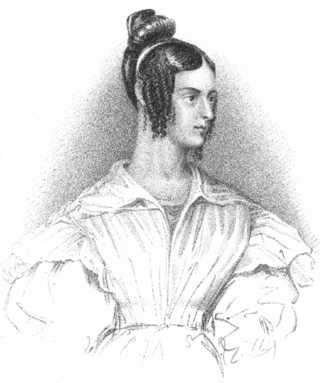
Amelia Cary, Viscountess Falkland, was a British noblewoman. She was born the fifth illegitimate daughter of William IV of the United Kingdom by his long-time mistress Dorothea Jordan. Amelia had four sisters and five brothers, all surnamed FitzClarence. Soon after their father became monarch, the FitzClarence children were raised to the ranks of younger children of a marquess. A granddaughter of George III, Amelia was named after her aunt Princess Amelia.

Lucius Henry Cary, 6th Viscount Falkland was a Scottish peer and Jacobite.
Admiral Plantagenet Pierrepont Cary, 11th Viscount Falkland was a Royal Navy officer who served in the First Anglo-Burmese War.
Henry Thomas Cary, 8th Viscount Falkland, styled Master of Falkland from 1780 to 1785, was a Scottish peer and British Army officer.
Captain Charles John Cary, 9th Viscount Falkland was a Scottish peer and Royal Navy officer.
Byron Plantagenet Cary, 12th Viscount Falkland was a Scottish peer and British Army officer.
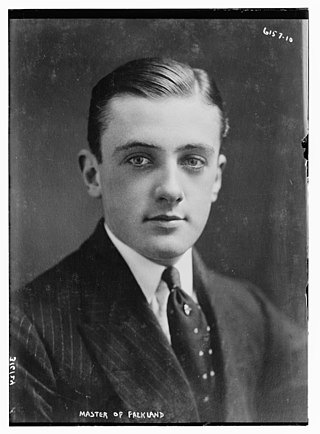
Lucius Plantagenet Cary, 13th Viscount Falkland, styled Master of Falkland from 1886 to 1922, was a Scottish peer. The eldest son of Byron Cary, 12th Viscount Falkland and his wife Mary, Cary was educated at Eton College and the Royal Military College, Sandhurst. He was commissioned into the Grenadier Guards on 6 December 1899, and served as a second lieutenant in the 2nd Battalion during the Second Boer War. He was promoted lieutenant by augmentation on 1 April 1903. Cary was seconded to the 3rd King's African Rifles and stationed in Nairobi from 1903 to 1905.
